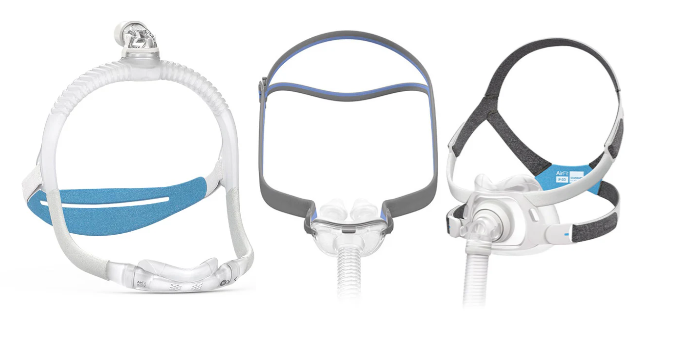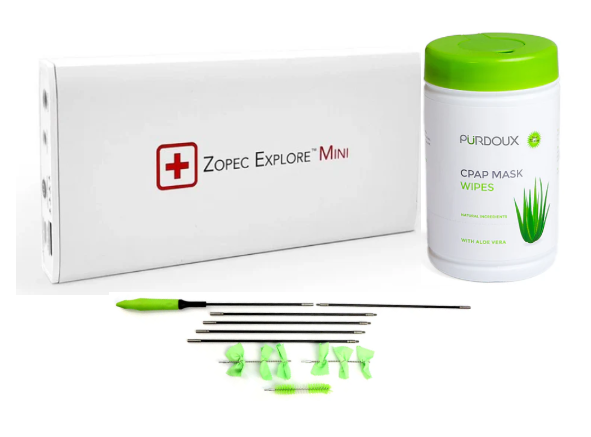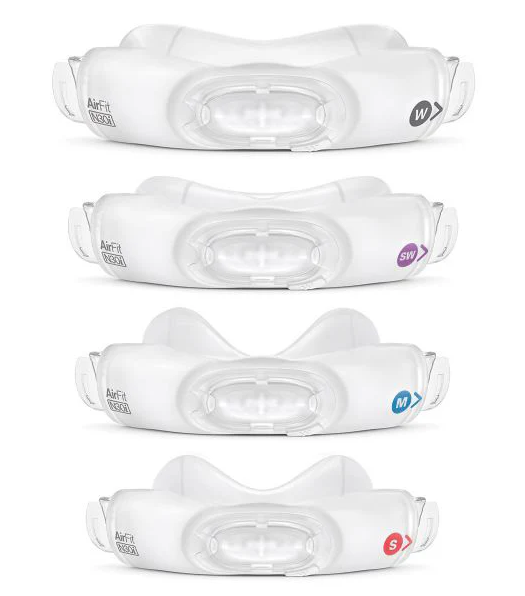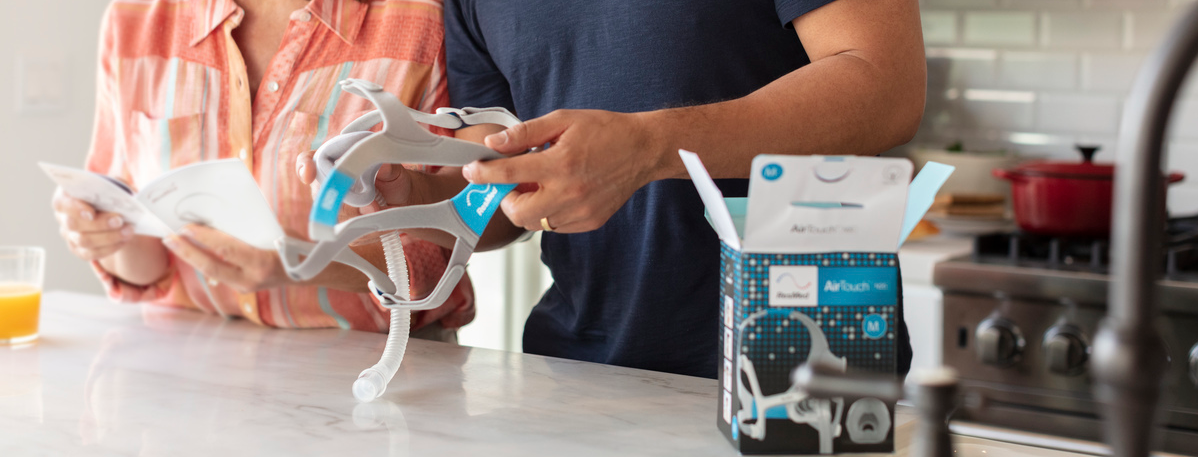Apnée du sommeil : comprendre la maladie et les solutions efficaces
Le sommeil est essentiel à notre santé globale et influence tout, de l'équilibre émotionnel au bien-être physique. L'apnée du sommeil, une affection fréquente mais souvent négligée, touche des millions de personnes dans le monde et reste fréquemment non diagnostiquée. Dans cet article, nous examinerons de plus près l'apnée du sommeil, en explorant ses différents types, ses symptômes courants et ses facteurs de risque. Nous aborderons également les stratégies de traitement efficaces, notamment les différents types d'appareils de PPC (pression positive continue) disponibles pour aider à gérer cette affection.
Qu'est-ce que l'apnée du sommeil ?
L’apnée du sommeil se caractérise par des interruptions répétées de la respiration pendant le sommeil. Ces interruptions peuvent entraîner un sommeil fragmenté et de nombreux risques graves pour la santé. Il existe trois principaux types d’apnée du sommeil :
- Apnée obstructive du sommeil (AOS) : Il s’agit de la forme la plus courante, caractérisée par un relâchement excessif des muscles de la gorge, bloquant les voies respiratoires pendant le sommeil. Ceci peut provoquer des ronflements bruyants et des halètements soudains.
- Apnée centrale du sommeil (ACS) : ce type d’apnée survient lorsque le cerveau n’envoie pas les signaux appropriés aux muscles respiratoires. L’ACS est moins fréquente et souvent associée à des problèmes de santé sous-jacents.
- Syndrome d'apnée du sommeil complexe (apnée du sommeil mixte) : combinaison d'apnée obstructive et d'apnée centrale du sommeil.
Symptômes de l'apnée du sommeil
Les symptômes courants comprennent :
- Ronflements bruyants
- Épisodes de suffocation ou d'étouffement pendant le sommeil
- Somnolence diurne excessive
- Difficultés de concentration
- Maux de tête matinaux
- Changements d'humeur ou irritabilité
Facteurs de risque de l'apnée du sommeil
Plusieurs facteurs peuvent augmenter la probabilité de développer une apnée du sommeil :
- Obésité
- L'âge (plus fréquent chez les personnes âgées)
- Le sexe (plus fréquent chez les hommes)
- Antécédents familiaux d'apnée du sommeil
- Consommation de tabac et d'alcool
- Certaines affections médicales comme le diabète et les maladies cardiaques
L'impact de l'apnée du sommeil sur la santé
L’apnée du sommeil non traitée peut entraîner de graves complications de santé, notamment :
- Risque accru d'hypertension artérielle et de maladies cardiaques
- Risque accru de développer un diabète de type 2
- Des problèmes cognitifs tels que des troubles de la mémoire et un risque accru de dépression
Approches naturelles pour gérer l'apnée du sommeil
Si de nombreuses personnes ont besoin d'interventions médicales pour traiter l'apnée du sommeil, plusieurs stratégies naturelles peuvent contribuer à atténuer les symptômes :
1. Changements de mode de vie
- Gestion du poids : Perdre du poids peut améliorer considérablement la gravité de l’apnée du sommeil.
- Position de sommeil : Dormir sur le côté peut aider à garder les voies respiratoires ouvertes.
- Éviter l'alcool et les sédatifs : ces substances peuvent détendre les muscles de la gorge et aggraver l'apnée du sommeil.
2. Hygiène du sommeil
- Un horaire de sommeil régulier : se coucher et se réveiller à la même heure chaque jour peut réguler votre horloge biologique.
- Créer un environnement propice au sommeil : Gardez votre chambre sombre, fraîche et silencieuse. Réduire le temps passé devant les écrans avant de vous coucher est également bénéfique.
3. Techniques de relaxation
Pratiquez des exercices comme la méditation ou la respiration profonde pour réduire le stress et favoriser un meilleur sommeil.
4. Considérations diététiques
Certains aliments et compléments alimentaires peuvent également favoriser un meilleur sommeil :
- Aliments riches en magnésium : Les légumes verts à feuilles, les noix et les graines peuvent aider à détendre les muscles.
- Tisanes : Les tisanes de camomille et de valériane sont connues pour leurs effets apaisants.
Les meilleurs compléments naturels pour favoriser un sommeil réparateur

Associer de saines habitudes de vie à des suppléments pour le sommeil adaptés peut favoriser la relaxation et faciliter l'endormissement. Voici quelques produits de qualité disponibles au Canada :
Les meilleurs somnifères naturels :
- SUKU Vitamins Sommeil Réparateur – Une délicieuse gomme à mâcher qui favorise l'endormissement et la relaxation. Formulée à base de mélatonine, de L-théanine et de GABA, des ingrédients reconnus pour leurs bienfaits sur le sommeil et la réduction du stress.
- ValeriCalm de St. Francis Herb Farm – Une teinture à base de six plantes apaisantes, dont la valériane. Soulage en douceur l'agitation sans provoquer de somnolence le lendemain.
- Provita Nervine – Un mélange de plantes qui soutient le système nerveux, contribuant à réduire l'anxiété, à soulager le stress et à favoriser un sommeil naturel.
- Poudre de citrate de magnésium Natural Calm – Reconnue pour ses effets apaisants, cette poudre aide à soulager les tensions musculaires et à améliorer la qualité du sommeil.
- Mélatonine liquide Nature's Harmony Sleep Tight – Un complément de mélatonine à action rapide sous forme liquide, idéal pour l'insomnie passagère, le travail posté ou le décalage horaire.
- Healthology Sleep - Formule pour un sommeil réparateur - Conçue pour soutenir votre rythme circadien et favoriser un sommeil profond et sain grâce à un mélange de magnésium, d'herbes apaisantes et de soutien des neurotransmetteurs.
- AOR Ortho Sleep – Une formule complète à base de mélatonine, de GABA, de 5-HTP et plus encore. Idéal en cas d'insomnie, de décalage horaire ou pour s'adapter au travail posté.
- Martin & Pleasance Harmony My Sleep – Une formule naturelle à base de plantes qui favorise un sommeil plus réparateur et soulage le stress. Elle associe des plantes chinoises et occidentales pour soutenir le système nerveux.
- Bell Lifestyle Sound Sleep – Favorise la relaxation et réinitialise naturellement votre cycle veille-sommeil, pour un repos ininterrompu.
Consultez toujours votre professionnel de la santé avant de commencer à prendre des compléments alimentaires, surtout si vous souffrez d'un problème médical ou si vous prenez des médicaments.
Quand consulter un médecin : Appareils CPAP pour l’apnée du sommeil
Pour de nombreuses personnes souffrant d'apnée du sommeil modérée à sévère, les changements de mode de vie et les remèdes naturels peuvent s'avérer insuffisants. Une intervention médicale est indispensable pour prévenir les risques graves pour la santé.
Qu'est-ce qu'un appareil CPAP ?

Un appareil de ventilation en pression positive continue (PPC) délivre un flux d'air constant à travers un masque, maintenant les voies respiratoires ouvertes et réduisant considérablement la fréquence des interruptions respiratoires pendant le sommeil.
Qui peut bénéficier d'un appareil CPAP ?
- Personnes souffrant d'apnée du sommeil modérée à sévère : celles qui subissent de fréquentes pauses respiratoires pendant leur sommeil.
- Ronfleurs chroniques souffrant de fatigue diurne : le traitement par PPC peut atténuer la somnolence excessive liée à l’apnée du sommeil.
- Patients à risque de maladie cardiovasculaire : la PPC peut réduire les risques pour la santé associés.
Types d'appareils CPAP
- Appareils CPAP standard : Ils fournissent un flux d’air continu à une pression fixe. Idéaux pour les utilisateurs ayant des besoins de pression stables.
- Appareils CPAP automatiques (APAP) : Ajustent automatiquement la pression de l’air en fonction des besoins de l’utilisateur tout au long de la nuit, offrant ainsi plus de confort et de flexibilité.
- Appareils de ventilation à pression positive à deux niveaux (BiPAP) : ils offrent deux niveaux de pression, l’un pour l’inspiration et l’autre, plus faible, pour l’expiration. Ils sont particulièrement bénéfiques pour les personnes qui trouvent la PPC standard inconfortable ou qui souffrent de problèmes respiratoires spécifiques. Ils sont également plus efficaces pour traiter l’apnée centrale du sommeil.
- Appareils CPAP de voyage : compacts et légers, ces appareils sont conçus pour un transport facile.
Choisir le bon masque
Le choix du masque adapté est crucial pour une thérapie efficace. Voici quelques options courantes :
- Masques nasaux : couvrent le nez ; idéaux pour ceux qui respirent par le nez.
- Masques faciaux complets : couvrent à la fois le nez et la bouche ; conviennent aux personnes qui respirent par la bouche ou qui souffrent de congestion nasale.
- Masques nasaux à coussinets : Un design minimaliste qui s'insère directement dans les narines, pour un confort optimal.
- Masques buccaux : Spécialement conçus pour les personnes qui respirent principalement par la bouche.
Accessoires essentiels pour CPAP

Pour améliorer l'efficacité du traitement par PPC, pensez aux accessoires suivants :
- Humidificateurs : Ils ajoutent de l’humidité à l’air, réduisant ainsi la sécheresse et les irritations.
- Filtres : Ils permettent de garder l’air propre et exempt d’allergènes.
- Tuyau – Relie votre masque à la machine ; disponible en différentes longueurs et styles, avec des options chauffantes pour réduire la condensation.
- Doublures pour masques : Améliorent le confort et l'ajustement du masque.
- Mentonnières : Elles aident à maintenir la bouche fermée, améliorant ainsi l'efficacité du traitement pour les personnes qui respirent par la bouche.
Conclusion
L'apnée du sommeil est une affection grave qui peut avoir un impact considérable sur la santé et la qualité de vie. Comprendre ses différentes formes (obstructive, centrale et complexe) ainsi que les types d'appareils de PPC disponibles est essentiel pour une prise en charge efficace. Si les méthodes naturelles peuvent soulager les cas légers, les personnes souffrant d'apnée du sommeil modérée à sévère nécessitent souvent un traitement médical.
Si vous pensez souffrir d'apnée du sommeil ou si vous présentez des symptômes associés, il est essentiel de consulter un professionnel de santé pour obtenir un diagnostic précis et des options de traitement personnalisées. Traiter l'apnée du sommeil peut améliorer votre sommeil et votre santé globale, et ainsi améliorer votre qualité de vie. Dormez bien !






